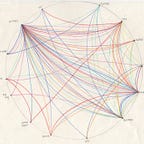Nullify Money, Solve Everything
Our Irrational Faith in Money is the Only True Barrier to Saving Ourselves
A global pandemic is raging. Medical care is scarce. Unemployment is off the charts. Food and housing are uncertain for millions.
What, again, is the current justification for the existence of money?
The lack of it stands between us and feeding everyone, caring for everyone, keeping everyone housed and secure and safe. And yet money is a construct, a figment of the collective imagination. What if we just woke from the dream, and stopped pretending it mattered?
For years it has become the substance of increasingly calamitous inequality, and a lever of power for a very few humans — accumulating money in disproportionate excess — to wield over very many. There has only ever been just enough of it to trickle out in tiny sums to keep the powerless laboring, out of aspiration that one day they’d be secure.
Now those millions are unemployed altogether. Money isn’t coming in at all. It feels as if the paltry little checks the powerful are sending out are a last-ditch effort not so much to pay our bills, but to simply keep us believing in the importance of money. It’s important to them that we believe, because the same policies are sending them million-dollar tax breaks, which would be rendered worthless if we just nullified dollars themselves.
As long as we stay in the debate about which bills to pay, which interest fees to accept, which debts are our top priority and which we must postpone, and we break out the calculators to figure out where to distribute our $1200 in the most effective way to keep us hopeful about future financial security, then we’re still playing to this power held over us.
When do we just stop believing in money? Very few of us have it. It’s an invisible, imaginary presence in our lives, and yet we shape our lives to collect it for the sake of ‘sustainability.’ Yet it’s not actually money that sustains us. There are many other currencies closer to the bone of our reality, ones which really animate our existence — food and shelter, for example. Climate stability, as another, is a currency billions would welcome a fortune in (but can’t necessarily earn, preoccupied as they are in striving and striving and striving for an illusory monetary income.)
The coronavirus pandemic has shown us that the care we give to one another may be the most essential currency of all. With schools closed, the work of many parents — even those still nominally employed — has snapped back to a most primal one: caregiving. And they, in turn, are made able to give this care by an income of care from all around: healthcare workers, neighbors, the people in our online lives. Nobody’s trading money these days, but we are trading tremendous sums of care.
Couldn’t this be enough for it’s own economy? What if the pressure to care and make money at the same time were relieved, and all we had to do was take care of others, and let others take care of us?
Policy debates seem to lean toward how to get people enough money to keep them believing in it, until we get through this crisis and can go back to playing with debt and labor and the endless game of three-card monte for security that we spend our lives playing. But then another thread of awareness out there, that we are never going back to ‘normal.’ The crises are racking up, and this one will be with us for years and years.
Shouldn’t we be celebrating not going back to normal anyway? The normal we were all living wasn’t especially good. For a tiny fraction of humanity, who had the guile or luck to accumulate money and security around them, ‘normal’ might be something to pursue a return to. For the rest of us, it would make more sense to declare those fortunes null, and determine exactly what kind of currency would make us all wealthy and secure, and center our next economy around that.
If money is a massive, mutual social agreement, it can be rendered meaningless, by simply withdrawing our complicit consent. This happens any time we land in a foreign country and try to spend the wrong currency: it’s refused because in that context people don’t believe in our money. We have to turn it into something locally relevant.
What’s locally relevant today? Not money. Virus tests. Food. Healthcare. Education. Shelter. Basic mutual care. Social connection. We’ve travelled, by pandemic, to a world where there is no exchange value for money. We need new currencies.
